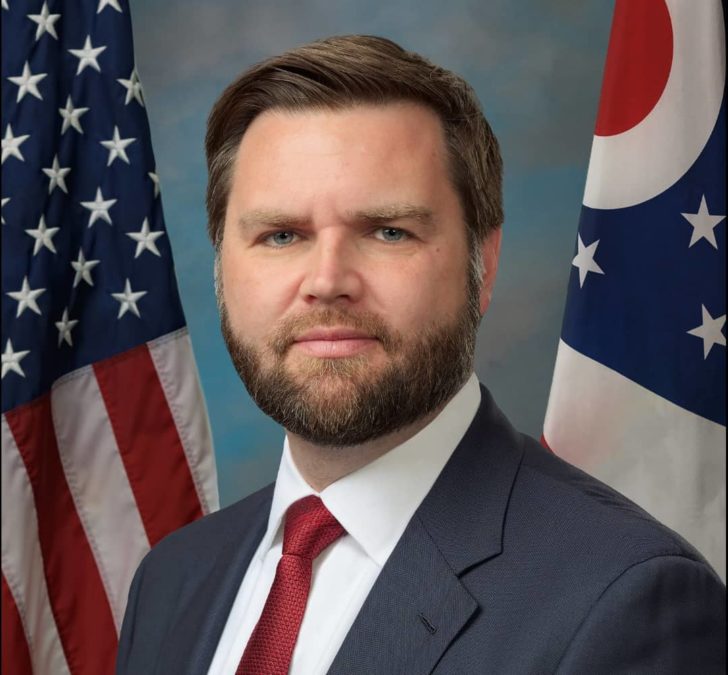Former President Donald Trump has selected Senator JD Vance, R-Ohio, as his vice presidential running mate for the 2024 election, transforming a former critic into a leading heir to his political legacy. JD Vance, who will turn 40 in August, offers a youthful counterbalance to Trump, 78, and President Joe Biden, 81. If elected, Vance would become the third-youngest vice president in U.S. history, following John Breckinridge and Richard Nixon. This decision follows closely on the heels of an assassination attempt on Trump, underscoring the importance of the vice presidential role.
JD Vance brings to the ticket his military experience as a Marine Corps veteran of the Iraq War, alongside right-wing populist views that resonate with Trump’s “America First” agenda. His opposition to U.S. aid to Ukraine and his efforts to delay Biden’s judicial appointments in protest of Trump’s legal battles highlight his alignment with Trump’s political stance. The selection process involved numerous candidates, narrowing down to finalists including Gov. Doug Burgum of North Dakota and Sen. Marco Rubio of Florida. Trump’s decision, expected to be confirmed at the Republican National Convention in Milwaukee, marks a significant milestone in Vance’s political ascent.
JD Vance: From Critic to Running Mate
JD Vance’s journey from a vocal Trump critic to his vice presidential pick is a striking narrative of political realignment. Vance’s 2016 memoir, “Hillbilly Elegy,” chronicled his experiences growing up in a troubled household, capturing the struggles of white working-class Americans and inadvertently aligning with Trump’s political rise. Initially, Vance was critical of Trump, describing him as “cultural heroin” and attributing some of his support to racism and xenophobia. He even voted for independent Evan McMullin in the 2016 election.
However, JD Vance’s views evolved as he pursued a political career. He moved back to Ohio and began to align himself more closely with Trump’s platform, raising funds for Trump and advocating for positions that mirrored Trump’s policies. His transformation from skeptic to supporter has provided ammunition for Biden and his allies to criticize the GOP ticket, but it also demonstrates Vance’s strategic political shift to embrace Trump’s populist appeal.
Vance’s Political Rise and Legislative Impact
Since his election to the Senate, JD Vance has established himself as a prominent figure in Republican politics, blending his reputation as a cultural warrior with a willingness to engage in bipartisan efforts. He has collaborated with Democratic senators like Elizabeth Warren and Tammy Baldwin on legislation aimed at financial accountability and promoting American-made products. Vance’s responsiveness during local crises, such as the toxic train derailment in East Palestine, Ohio, has further solidified his standing among his constituents.
Vance’s selection as Trump’s running mate is seen by many as a continuation of his rapid political ascent. With his background in venture capital and a law degree from Yale, Vance brings a blend of intellectual rigor and populist fervor to the ticket. His ability to navigate complex legislative landscapes while maintaining a strong connection with his base positions him as a formidable figure in the upcoming election. As the Republican National Convention approaches, Vance’s selection is poised to energize Trump’s campaign and galvanize supporters with a vision of youthful vigor and steadfast commitment to their shared political ideals. The Formative Years: James Donald Bowman’s Transformation into J.D. Vance
Born James Donald Bowman in 1984, Vance’s early life was marked by significant familial changes and challenges. Named after his father, Donald Bowman, Vance experienced his first major upheaval when his father left the family around the time he began walking. His mother later renamed him James David Hamel, combining an uncle’s first name with the surname of his adopted father. These early years set the stage for the values and identity Vance would carry into adulthood.
When he married Usha, JD Vance chose to honor the grandparents who raised him by taking their surname. This decision was a tribute to Mamaw and Papaw Vance, who played pivotal roles in his upbringing in Middletown, Ohio. Their influence was profound, shaping not only his character but also the values he would later espouse in his memoir, “Hillbilly Elegy.”
Influence of Mamaw and Papaw: Values and Lessons in ‘Hillbilly Elegy’
Mamaw and Papaw Vance were central figures in “Hillbilly Elegy,” depicted as rough-edged and sharp-tongued, yet deeply well-meaning heads of a family often in crisis. Their portrayals, particularly Glenn Close’s Academy Award-nominated performance as Mamaw in the film adaptation, captured their complex, yet guiding presence in Vance’s life. Their teachings on fighting and loyalty left a lasting imprint on Vance’s character and worldview.
In his memoir, JD Vance recounts the basic rules of fighting taught by his grandparents: “You never start a fight; you always end the fight if someone else starts it; and even though you never start a fight, it’s maybe okay to start one if a man insults your family.” This principle underscores the fierce loyalty that defined his family relationships. Mamaw’s acute sense of loyalty and aversion to any perceived disloyalty significantly influenced Vance, illuminating his later political transformation from a Trump skeptic to an unshakable ally.














